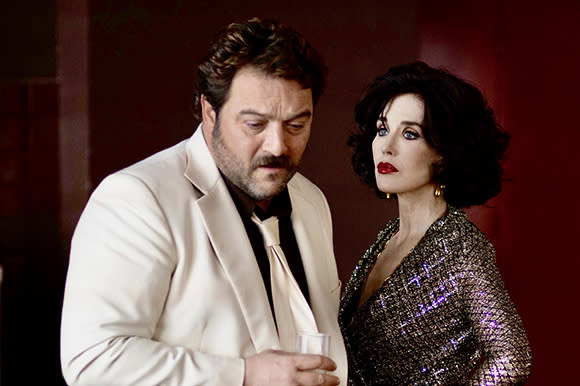Berlin Review: François Ozon’s Festival Opener ‘Peter Von Kant’
- Oops!Something went wrong.Please try again later.
- Oops!Something went wrong.Please try again later.

It’s a neat conceit, making the directing colossus of 1970s German cinema into the star of his own show. Peter Von Kant, the opening film of the Berlin Film Festival, is “freely adapted” by French director François Ozon from The Bitter Tears Of Petra Von Kant, Rainer Werner Fassbinder’s highly stylized 1972 story of three women locked in a toxic triangle of love, jealousy, domination and submission. The storyline and much of the dialogue, is the same; where Ozon shakes it up is by making the trio all men.
Ozon has tangled with Fassbinder before. His 2000 film, Water Drops On Burning Rocks, which also dealt with power struggles within sexual relationships, was adapted from a Fassbinder play. Taking on The Bitter Tears Of Petra Von Kant, a recognized landmark of European cinema, is a bolder move, made at a different moment in Ozon’s career. This is maestro on maestro — and there is no question that Ozon makes it his own.
More from Deadline
Most significantly, fashion designer Petra becomes film director Peter, played by Denis Ménochet. Where Margit Carstensen was languidly soignée as Petra, Ménochet’s Peter is fat, sweaty, mercurial and constantly snuffling a pharmacopeia of drugs washed down with gin in between manic bouts of work. There is no mistaking it: Fassbinder has returned as his own heroine. For Ozon, that idea must have been well-nigh irresistible.
For so long a colorful supporting actor, Ménochet moves center stage here with appropriately seedy aplomb. The story itself is moved from Bremen to Cologne. Peter lives in a magnificently converted village house with a bank of windows, like a hothouse for overheated emotions. Most of our time is spent in the shadowy indoors, but sometimes we are outside, catching a glimpse of a lonely figure at the window.
Peter is attended by factotum Karl (Stefan Crepon), who hovers constantly lest he be required to fetch champagne, type a letter or slow dance with his master; never speaking but watching for the slightest hint of a beckon or frown. Crepon is marvelously abject, skinny and mincing with the helpless, huge-eyed gaze of a bush baby.
Peter has a daughter, Gabrielle, packed away to boarding school and a largely absent but dependent mother, Rosemarie. Rosemarie is played by Hannah Schygulla, who played Petra’s object of desire in Fassbinder’s original. Now 78, she wears her advanced years like furs.
Into this gloomy household comes Khalil Ben Gharbia as Amir Ben-Salem, the carelessly beautiful young man who turns Peter into putty. Amir is shallow, lazy and adorable. He arrives with the simpering Sidonie (Isabelle Adjani), one of Peter’s longstanding actress cronies; just one look, as the song goes, and Peter hears a bell ring.
Anyone can see that Amir sees Peter as a stepping stone. Peter, bloated, blubbering and bedraggled as he is, must know that. Amir may not even be gay, despite the lurid stories of his nighttime adventures he uses to torture his benefactor. And Peter is duly tortured. While whole walls of his palatial pad are given over to murals of his beloved, others are plastered with Renaissance paintings of Saint Sebastian, writhing under a hail of arrows.
What’s It Like At The Berlin Film Festival?
Always a brisk storyteller, Ozon delivers a film that is 30 minutes shorter than Fassbinder’s. He keeps it in the 70s, but the ornate decadence and operatic sweep of the original is reduced to something altogether smaller: a melodrama rather than an epic tragedy. And while the women in the original were exquisite divas, Ménochet’s Peter and the louche Amir are more like actual people. Only Adjani, fluting her unlikely dialogue as if to the mannered-born, retains the over-elaborated artificiality of the original.
Most importantly, of course, Ozon has given the story a sex change. Whether this really succeeds is open to question. Fassbinder’s women in wigs, festooned with jewels, draped and corseted in satin generated a particular heat that drew on a whole history of fictional spaces dominated by women. Brothels, convents, the conclaves of women in Hollywood melodramas and, in many of Ozon’s own films, such as 8 Women: women as men imagined them, perhaps, but conjuring an atmosphere that is potent and very particular.
Like Fassbinder, Ozon is a prolific filmmaker who spins a good yarn. Peter Von Kant is an effective divertissement about sex, loneliness and sadism. But Ozon knows as well as any director alive — as well as the late Fassbinder, come to that — that there isn’t the same dynamic between men on screen. Peter Von Kant is a worthy homage, but The Bitter Tears Of Petra Von Kant was always a women’s picture.
Best of Deadline
Cancellations/Renewals Scorecard: TV Shows Ended Or Continuing In 2021-22 Season
What's New On HBO Max For January 2022: Day-By-Day Listings For TV Shows & Movies
New On Prime Video For January 2022: Daily Listings For Streaming TV, Movies & More
Sign up for Deadline's Newsletter. For the latest news, follow us on Facebook, Twitter, and Instagram.

